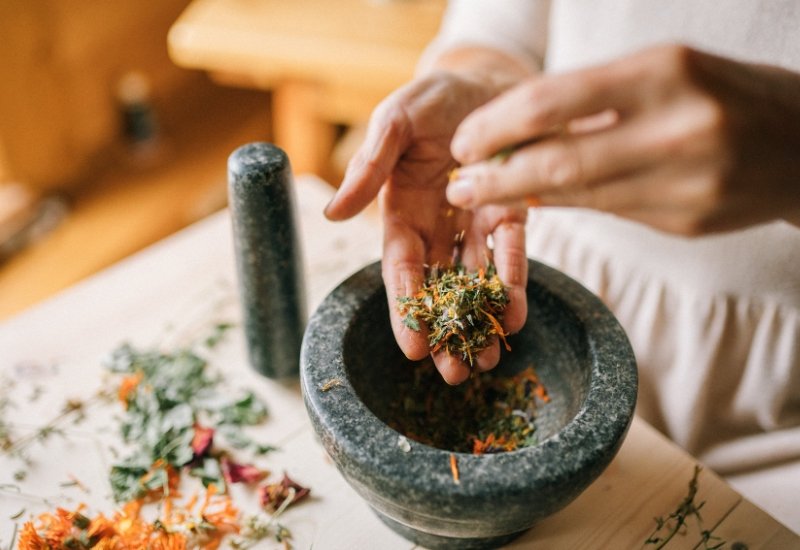
Ayurvedic Self-Care Practices for Immunity Boosting
Ayurvedic self care practices that help boost immunity – Ayurvedic self-care practices that help boost immunity offer a holistic approach to wellness, rooted in ancient wisdom that emphasizes balance and harmony within the body. This ancient system of medicine believes that a strong immune system is essential for overall health and well-being, and that by adopting certain practices, we can enhance our body’s natural defenses against illness.
Ayurveda focuses on the concept of Doshas, which are three fundamental energies that govern our physical and mental constitution. By understanding our individual Dosha imbalances, we can tailor our self-care practices to promote balance and support our immune system.
This includes making conscious choices about our diet, lifestyle, and even the herbs we use.
Introduction to Ayurvedic Self-Care

Ayurveda, an ancient Indian system of medicine, emphasizes a holistic approach to health and well-being. It views the body as a complex ecosystem where physical, mental, and spiritual aspects are interconnected. The core principle of Ayurveda is to achieve balance and harmony within this system, promoting optimal health and preventing disease.
The Importance of Maintaining Balance (Doshas)
Ayurveda identifies three fundamental energies or doshas: Vata, Pitta, and Kapha. Each dosha represents a specific combination of elements and governs various bodily functions. Maintaining a balanced state of these doshas is crucial for overall health and immunity. When doshas become imbalanced, it can lead to various health issues, including weakened immunity.
Key Concepts Related to Ayurvedic Self-Care Practices
Ayurveda offers a comprehensive approach to self-care, focusing on lifestyle, diet, and other practices to maintain balance and enhance immunity. Some key concepts include:
Dinacharya (Daily Routine)
A consistent daily routine helps regulate the body’s natural rhythms and supports healthy dosha balance.
- Waking up early and going to bed early promotes a healthy sleep cycle.
- Regular exercise, such as yoga or brisk walking, improves circulation and strengthens the immune system.
- A balanced diet rich in fresh fruits, vegetables, and whole grains nourishes the body and supports healthy digestion.
- Mindfulness practices, such as meditation or deep breathing exercises, reduce stress and promote relaxation.
Ritucharya (Seasonal Living)
Ayurveda emphasizes adapting lifestyle choices to the changing seasons.
- During the summer, it’s important to stay hydrated, eat lighter foods, and avoid excessive sun exposure.
- In the winter, warm foods and drinks, along with increased rest, are recommended.
Rasayana (Rejuvenating Practices)
Rasayana practices aim to enhance vitality, longevity, and immunity. These practices include:
- Consuming nourishing herbs and foods like turmeric, ginger, and amla.
- Engaging in regular exercise and physical activity.
- Practicing mindfulness and stress-reduction techniques.
Abhyanga (Ayurvedic Massage)
Ayurvedic massage, using warm herbal oils, helps to relax muscles, improve circulation, and detoxify the body.
Panchakarma (Ayurvedic Detoxification)
Panchakarma is a comprehensive detoxification program that involves a series of therapies to cleanse the body and restore balance.
Dietary Practices for Immunity Boosting

Ayurveda emphasizes the importance of a balanced diet for maintaining overall well-being, including a robust immune system. According to Ayurvedic principles, a balanced diet is one that nourishes all three doshas (vata, pitta, and kapha) in the body, promoting harmony and optimal functioning.
A diet that strengthens the immune system focuses on consuming foods that are easy to digest, warm, and nourishing, while avoiding those that are heavy, cold, or inflammatory.
Foods and Herbs for Immunity Boosting
Ayurveda identifies a wide array of foods and herbs that are considered to be immune-boosting. These foods are believed to help strengthen the body’s natural defenses, making it more resilient to illness.
- Ginger: A potent anti-inflammatory, ginger is believed to help clear congestion and support the immune system. It can be added to soups, teas, and stir-fries.
- Turmeric: Known for its anti-inflammatory and antioxidant properties, turmeric is often used in Ayurvedic medicine to boost immunity. It can be added to curries, soups, or taken as a supplement.
- Garlic: Garlic is believed to have antimicrobial and antiviral properties, making it a valuable food for supporting the immune system. It can be added to a variety of dishes, such as soups, stews, and sauces.
- Amla (Indian Gooseberry): A rich source of Vitamin C, amla is considered a powerful immune booster in Ayurveda. It can be consumed fresh, dried, or in juice form.
- Ashwagandha: An adaptogenic herb, ashwagandha is believed to help the body adapt to stress, which can weaken the immune system. It is often taken as a supplement or used in teas.
- Guduchi (Tinospora cordifolia): Another adaptogenic herb, guduchi is considered a potent immune-modulator in Ayurveda. It is often taken as a supplement or used in teas.
- Tulsi (Holy Basil): Tulsi is a revered herb in Ayurveda, known for its adaptogenic and immune-boosting properties. It can be consumed as tea, added to food, or taken as a supplement.
- Foods rich in Vitamin C: Examples include citrus fruits (oranges, lemons, grapefruits), berries (strawberries, blueberries, raspberries), and leafy green vegetables (spinach, kale, broccoli).
- Foods rich in Zinc: Examples include oysters, beef, pumpkin seeds, and chickpeas.
- Foods rich in Selenium: Examples include Brazil nuts, tuna, and eggs.
Sample Daily Meal Plan
A sample daily meal plan incorporating immune-boosting foods and herbs might look like this:
- Breakfast: Warm porridge with turmeric, ginger, and cinnamon, topped with fresh berries and a drizzle of honey.
- Lunch: Lentil soup with garlic, ginger, and turmeric, served with a side of brown rice and steamed vegetables.
- Dinner: Roasted chicken with turmeric and ginger, served with a side of roasted vegetables and a salad with a lemon-ginger dressing.
- Snacks: A handful of almonds, a cup of green tea with tulsi, or a smoothie made with amla, spinach, and banana.
Lifestyle Modifications for Enhanced Immunity: Ayurvedic Self Care Practices That Help Boost Immunity

Ayurveda emphasizes the importance of a holistic approach to health, recognizing that lifestyle plays a crucial role in boosting immunity. By incorporating daily routines that align with Ayurvedic principles, we can create a strong foundation for a healthy and resilient immune system.
Ayurvedic practices like incorporating warming spices like turmeric and ginger into your diet can help boost immunity, and it’s also a great way to add vibrant color to your Thanksgiving table. For more inspiration on filling your table with color, check out this article on 5 ways to fill your thanksgiving table with color.
Once you’ve got your colorful table set, remember to focus on consuming plenty of colorful fruits and vegetables throughout the holiday season to keep your immune system strong.
The Importance of Regular Exercise
Regular exercise is an essential component of a healthy lifestyle and is particularly important for strengthening the immune system. According to Ayurveda, exercise helps to circulate vital energy (prana) throughout the body, promoting detoxification and improving overall well-being. It also helps to reduce stress, which can weaken the immune system.
The Benefits of Adequate Sleep
Adequate sleep is crucial for immune function. During sleep, the body repairs and rejuvenates itself, allowing the immune system to function optimally. Ayurveda recommends a minimum of 6-8 hours of sleep per night, ideally before 10 pm, when the body is naturally in a state of rest.
Stress Management Techniques
Stress can significantly weaken the immune system, making it more susceptible to illness. Ayurveda emphasizes the importance of stress management techniques to maintain a healthy immune response. Practices like yoga, meditation, and deep breathing exercises help to calm the mind and body, reducing stress hormones and promoting relaxation.
The Benefits of Yoga, Meditation, and Deep Breathing
Yoga, meditation, and deep breathing exercises are powerful tools for boosting immunity and promoting overall well-being. Yoga helps to improve circulation, flexibility, and strength, while also calming the mind. Meditation reduces stress and promotes relaxation, while deep breathing exercises help to oxygenate the blood and improve lung capacity.
These practices have been shown to have a positive impact on immune function, reducing inflammation and improving overall health.
Ayurvedic Lifestyle Recommendations for Different Doshas
In Ayurveda, the three Doshas, Vata, Pitta, and Kapha, represent fundamental energies that influence our physical and mental well-being. Understanding your dominant Dosha and any imbalances can provide valuable insights into your unique constitution and help you create a personalized self-care plan for boosting immunity.
Vata Dosha and Immunity
Vata is characterized by air and ether elements, making it responsible for movement, creativity, and communication. When Vata is balanced, it contributes to a healthy immune system. However, an imbalanced Vata can lead to weakened immunity, making you more susceptible to infections and illnesses.
Vata-Specific Ayurvedic Self-Care Practices
Vata imbalances often manifest as dryness, coldness, and irregularity. To restore balance and enhance immunity, focus on practices that promote grounding, warmth, and routine.
- Dietary Recommendations:Include warm, cooked foods like soups, stews, and porridge. Incorporate grounding foods like sweet potatoes, root vegetables, and grains like rice and quinoa. Avoid cold, raw foods, and excessive caffeine or alcohol.
- Lifestyle Modifications:Establish regular sleep patterns, create a consistent daily routine, and practice relaxation techniques like yoga, meditation, or deep breathing exercises. Avoid excessive travel and late-night activities.
- Specific Herbs/Supplements:Consider incorporating herbs like ginger, turmeric, and cinnamon, which are known for their warming and immune-boosting properties. Ashwagandha is also beneficial for calming Vata and supporting the immune system.
Pitta Dosha and Immunity
Pitta, dominated by fire and water elements, governs metabolism, digestion, and transformation. Balanced Pitta contributes to a strong immune system. However, an imbalanced Pitta can lead to inflammation and weaken the immune response.
Pitta-Specific Ayurvedic Self-Care Practices
Pitta imbalances often manifest as heat, acidity, and inflammation. To restore balance and enhance immunity, focus on practices that cool, soothe, and promote digestion.
Ayurvedic self-care practices like incorporating warming spices like turmeric and ginger into your diet can do wonders for boosting immunity. But sometimes, we lose sight of these healthy habits in the hustle and bustle of life. If you find yourself needing a reboot, consider checking out ways to rediscover lost healthy habits to regain your focus on holistic well-being.
Then, you can confidently integrate these Ayurvedic practices into your routine, creating a strong foundation for a healthy and vibrant life.
- Dietary Recommendations:Opt for cooling foods like cucumbers, spinach, and coconut water. Avoid spicy, fried, and overly processed foods. Include bitter foods like leafy greens and dandelion to balance Pitta.
- Lifestyle Modifications:Practice regular exercise, prioritize relaxation and stress management techniques like meditation or deep breathing exercises. Avoid excessive sun exposure and strenuous activities during hot weather.
- Specific Herbs/Supplements:Consider incorporating herbs like aloe vera, coriander, and mint, which are known for their cooling and anti-inflammatory properties. Brahmi is also beneficial for calming Pitta and supporting cognitive function.
Kapha Dosha and Immunity
Kapha, composed of earth and water elements, governs structure, lubrication, and stability. Balanced Kapha contributes to a strong immune system. However, an imbalanced Kapha can lead to sluggishness and congestion, weakening the immune response.
Kapha-Specific Ayurvedic Self-Care Practices
Kapha imbalances often manifest as heaviness, congestion, and sluggishness. To restore balance and enhance immunity, focus on practices that promote lightness, warmth, and activity.
Ayurvedic self-care practices, like daily yoga and a balanced diet, are a great way to strengthen your immune system. It’s all about finding the right balance in your life, just like Charlotte did when she went on that amazing vacation that helped her lose half her body weight! Read all about it here.
Once you’ve found that balance, you’ll be able to incorporate these practices into your daily routine, boosting your immunity and overall well-being.
- Dietary Recommendations:Choose lighter, warming foods like soups, stews, and roasted vegetables. Incorporate spices like ginger, pepper, and cinnamon to stimulate digestion. Avoid heavy, oily, and sweet foods.
- Lifestyle Modifications:Engage in regular exercise, especially activities that promote sweating and detoxification. Practice early rising, maintain a consistent sleep schedule, and avoid oversleeping. Limit sedentary activities.
- Specific Herbs/Supplements:Consider incorporating herbs like ginger, garlic, and turmeric, which are known for their warming and immune-boosting properties. Triphala is also beneficial for cleansing the body and supporting digestion.
Ayurvedic Lifestyle Recommendations for Different Doshas
| Dosha | Dietary Recommendations | Lifestyle Modifications | Specific Herbs/Supplements |
|---|---|---|---|
| Vata | Warm, cooked foods like soups, stews, and porridge. Grounding foods like sweet potatoes, root vegetables, and grains like rice and quinoa. Avoid cold, raw foods, and excessive caffeine or alcohol. | Establish regular sleep patterns, create a consistent daily routine, and practice relaxation techniques like yoga, meditation, or deep breathing exercises. Avoid excessive travel and late-night activities. | Ginger, turmeric, cinnamon, Ashwagandha |
| Pitta | Cooling foods like cucumbers, spinach, and coconut water. Avoid spicy, fried, and overly processed foods. Include bitter foods like leafy greens and dandelion to balance Pitta. | Practice regular exercise, prioritize relaxation and stress management techniques like meditation or deep breathing exercises. Avoid excessive sun exposure and strenuous activities during hot weather. | Aloe vera, coriander, mint, Brahmi |
| Kapha | Lighter, warming foods like soups, stews, and roasted vegetables. Incorporate spices like ginger, pepper, and cinnamon to stimulate digestion. Avoid heavy, oily, and sweet foods. | Engage in regular exercise, especially activities that promote sweating and detoxification. Practice early rising, maintain a consistent sleep schedule, and avoid oversleeping. Limit sedentary activities. | Ginger, garlic, turmeric, Triphala |
Ayurvedic Herbal Remedies for Immunity Boosting
Ayurveda, the ancient Indian system of medicine, emphasizes a holistic approach to health and well-being. It recognizes that immunity is not just about fighting off infections but also about maintaining overall balance and vitality. Ayurvedic herbal remedies have been used for centuries to strengthen the immune system and promote health.
Herbal Teas for Immune Support, Ayurvedic self care practices that help boost immunity
Herbal teas are a simple and effective way to incorporate Ayurvedic herbs into your daily routine. These teas can help to soothe the body, reduce inflammation, and boost immunity.
- Ginger tea:Ginger is a powerful anti-inflammatory and has been shown to boost the immune system. It can help to relieve cold symptoms and reduce nausea.
- Turmeric tea:Turmeric contains curcumin, a potent antioxidant that has anti-inflammatory and immune-boosting properties. It can help to protect against infections and reduce inflammation.
- Tulsi tea:Tulsi, also known as holy basil, is an adaptogenic herb that helps the body cope with stress. It has antiviral and antibacterial properties and can help to boost immunity.
- Ashwagandha tea:Ashwagandha is an adaptogenic herb that can help to reduce stress and improve sleep quality. It also has immune-boosting properties and can help to protect against infections.
Ayurvedic Herbs for Immunity
Several Ayurvedic herbs are specifically known for their immune-boosting properties. These herbs can be taken in various forms, including capsules, powders, and tinctures.
- Guduchi (Tinospora cordifolia):Guduchi is a powerful herb that is known for its immune-boosting and antiviral properties. It can help to protect against infections and reduce inflammation.
- Amla (Emblica officinalis):Amla is a rich source of vitamin C and antioxidants. It can help to boost immunity, protect against infections, and improve overall health.
- Neem (Azadirachta indica):Neem is a powerful herb with antibacterial, antiviral, and antifungal properties. It can help to protect against infections and promote skin health.
- Garlic (Allium sativum):Garlic is a potent antimicrobial agent that can help to boost immunity and fight infections. It can also help to lower blood pressure and cholesterol levels.
Important Considerations
While Ayurvedic herbs can be beneficial for boosting immunity, it is essential to use them responsibly. It is always best to consult with a qualified Ayurvedic practitioner before taking any herbs, especially if you are pregnant, breastfeeding, or have any underlying health conditions.
Additionally, it is important to note that herbal remedies should not be considered a substitute for conventional medical treatment. If you are experiencing any health concerns, it is crucial to seek professional medical advice.
Conclusive Thoughts
Incorporating Ayurvedic self-care practices into our daily routines can be a powerful way to strengthen our immune system and promote overall well-being. From nourishing our bodies with immune-boosting foods to practicing stress-reducing techniques, these ancient wisdoms offer a roadmap to a healthier, more vibrant life.
By embracing the principles of Ayurveda, we can empower ourselves to take charge of our health and cultivate a stronger, more resilient immune system.






